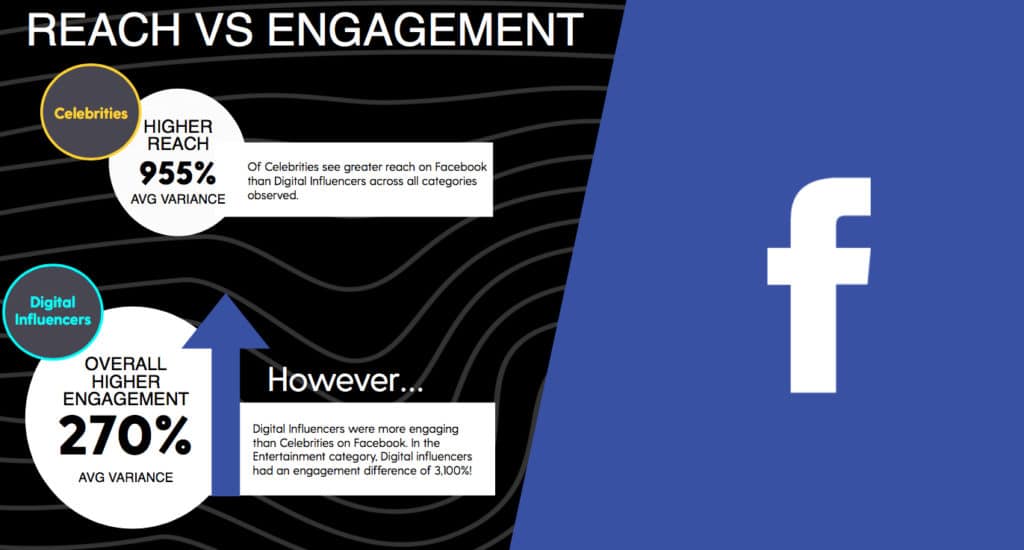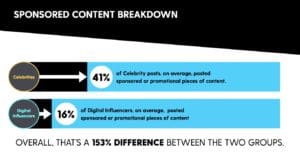Influencer marketing is no longer an emerging marketing tactic, it’s now a fundamental channel for brands to connect with consumers. But as marketers come to terms with this relatively new reality, countless questions have surfaced about the best approach to activate this social media channel.
Over the past 18 to 24 months, MediaCom Social has responded to a dizzying array of questions, with increasing complexity. Interestingly, even though they come from many different clients with widely varying objectives, there are many questions everyone asks. We sought to address a few of these FAQs in our study, “Celebrities and Digital Influencers: The Data You’re Missing.”
MediaCom, in collaboration with the teams at Playa/FullScreen and Sylo, analyzed data from 50 celebrities and 50 social media influencers across various categories to gauge differences in reach and engagement between both groups. The study also looked at sponsored content, audience composition and compliance with disclosure rules as defined by the Federal Trade Commission.
We sought to understand how brands can mitigate exposure to bots, engagement fraud and fake followers when choosing creators to activate as influencers.
What we found
Throughout the project the teams encountered a few “ah-ha moments” and unearthed a surprise or two, but for the most part, the study validated commonly held assumptions that served as our hypotheses.
It came as no surprise that celebrities have much greater reach across social channels. Actors, models, athletes, musicians, celebrity chefs and the like deliver on average 955% more reach across Facebook than digital influencers. However, the Facebook data also indicated that digital influencers have much stronger engagement.

Twitter showed even more marked differences.
- Celebrities had more reach across all categories, 3,517% on average.
- Meanwhile, digital influencers were 398% more engaging on average.
- Fashion and beauty influencers were 1,700% more engaging than celebrities on Twitter!
The same dynamic was observed on all other platforms.
- On Instagram, celebrities had 19 times the reach, but influencers had 107% more engagement.
- On YouTube, celebrities had 48% greater reach, but influencers had 214% stronger engagement.
Content: Does it matter or not? It depends
What became clear is that celebrities do not need to create great content to garner large social audiences. Most achieved fame on the stage, screen, field, court or other arena and use social channels to further extend their celebrity status, promote projects, causes and sponsored content.
On the other hand, digital influencers must create great content to garner large followings that consistently resonates with their audiences in order to succeed and eventually attract brands.
Since content and community are essential for success, digital influencers have developed stronger creative skills and are willing to dedicate time/energy to interacting with their audiences. The study confirms that while celebrities are the stronger reach play, digital influencers consistently deliver much stronger engagement thanks to their commitment to content and community.
Learn what’s right for you
With regards to audience composition and target audiences, it’s imperative for marketers to understand the alignment between brands and influencers. Generally speaking, celebrity audiences mirror the general population more than those of digital influencers whose audiences tend to skew younger. In somewhat of a surprise, the study indicated digital influencers have double the reach into the 13- to 17-year-old segment compared to celebrities.
Balancing Act
For both influencers and celebrities, it’s important to strike a proper balance between sponsored and organic content. When a social feed is overly crowded with sponsored content, it can be perceived as having no audience connection nor cohesive story other than hawking brands. We found this to be more common with celebrities who post promotional/sponsored content more often—41% of the time, compared to 16% of the time for digital influencers. This is likely another contributor to lower engagement numbers.
However, influencers do run the risk of being perceived as “sell outs” if they work with brands that are not relevant with their audience nor aligned with the creator’s content themes.
This is the biggest mistake an influencer can make as it can permanently impact perceived authenticity. Therefore, digital influencers must resist lucrative temptations that do not align. At the same time, marketers must be mindful of this dynamic to be strategically sound in their approach to influential creators.
Transparency Matters
Another surprising discovery was the high number of instances of non-disclosed promotional activity. Both celebrities and digital influencers frequently post non-compliant content as defined by FTC guidelines. Given the penalties levied upon infringing marketers, this needs to be a priority. Marketers must be transparent about their sponsored relationships and ensure proper disclosure of all sponsored content and influencer activations.
Influencer Vetting Evolved
Focusing on fan and follower counts to determine “influence” is not a practice we would endorse, based on our study. Prioritizing audience size has led many celebrities and digital influencers to artificially inflate audiences. The issue of buying “fake followers” to boost their numbers is real and pervasive.
Thankfully, marketers and creators now have technologies at their disposal to help identify suspect audiences and potentially fraudulent activity. All influential creators, including celebrities, should take great care to police their audiences and purge fake accounts when identified. Brands have already begun scrutinizing influencer and celebrity accounts more closely and those deemed to have purchased followers and/or engagement will most likely be eliminated from consideration.
Just like any other campaign or program, influencer activations should align with a brand’s business goals and objectives. Establishing KPIs based on third party-validated brand lift or sales studies are ideal but often unrealistic. There’s a new alternative. It’s time we embrace third-party participation. A new micro-industry is emerging that will provide unbiased, objective validation of influencer metrics to help quantify the true value of each activation. In the not too distant future, marketers will no longer allow creators to “grade their own homework.”





Pa Frans on
Hai Jeff, this article is a nice eye opener for me, fantastic.
I am curious in lifecycle of both the famous ones and the digital influencers. The pressure of fashion and the technical development. Best regards, PA.
PS I hope I Understood the article in the right way🎓🤗😍